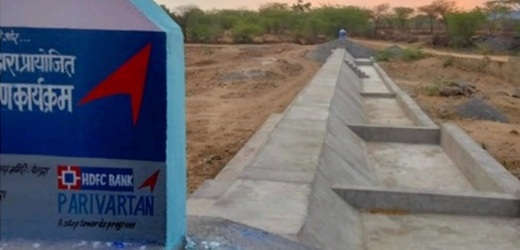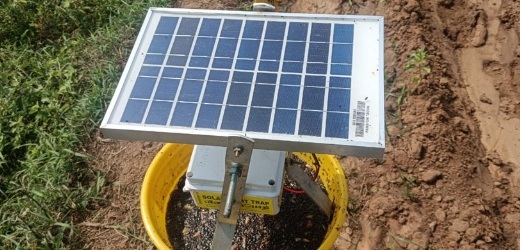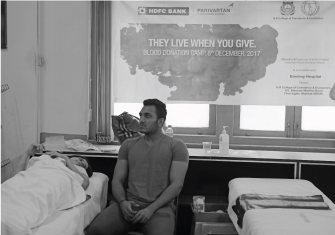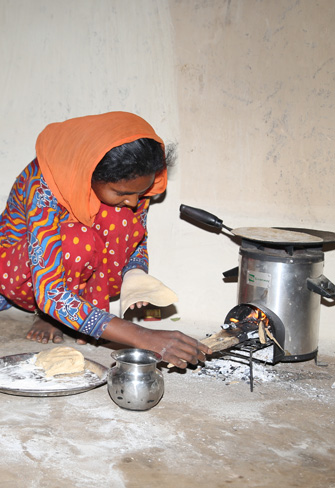Natural Resource Management
-
14,520
Water Conservation Structures developed
-
69240
Solar Lights installed
For many rural communities in India, access to essential natural resources like water and energy is a
daily challenge.
To ensure that these communities can thrive sustainably, we focus on managing natural resources effectively. This involves promoting water conservation, sustainable agriculture, biodiversity conservation, soil quality, renewable energy solutions, and community empowerment. By addressing these critical areas, we aim to improve agricultural productivity and enhance livelihoods, contributing to a more sustainable environment.
- Case Studies

Ladakh Ice Stupas
The Ice Stupa project in Ladakh, supported by HDFC Bank Parivartan, addresses severe water shortages caused by climate change. Ladakh's glaciers are thinning, and precipitation has dropped by nearly 50% over the past two decades, leading to critical water scarcity. Ice Stupas, artificial glaciers, divert stream water in winter, freezing it into cone-shaped structures that melt in spring, providing a steady water supply for agriculture.
Automation technology enhances the effectiveness of Ice Stupas by regulating water flow, optimizing ice formation, and monitoring weather patterns in real time. This improves water management, scalability, and impact. For the winter season 2024-25, four new Ice Stupas with a storage capacity of over 35 million liters have been built, benefiting seven villages. This initiative aims to improve livelihoods and water security, potentially benefiting nearly 200 more villages in Leh and Kargil districts. The project exemplifies how innovation can drive sustainability in challenging environments.


Water Management in Rajasthan

Chainpura, a village in Bhilwara District, Rajasthan, faced severe water scarcity affecting 446 households. The villagers, primarily dependent on agriculture and livestock, struggled with erratic rainfall and limited irrigation facilities. To address this, a project was initiated by HDFC Bank Parivartan and FES to construct an anicut (check dam).
Completed in April 2022, the anicut harnesses rainwater, providing a sustainable water supply for irrigation and livestock. This intervention has significantly improved agricultural productivity, benefiting 42 farm households across 45 acres of land. The anicut also provided drinking water to 510 cattle in the village. The villagers now experience increased crop yields, better income levels, and enhanced quality of life.
This project exemplifies effective water management strategies in drought-prone areas, showcasing the positive impact of community-driven initiatives on rural livelihoods.



The Solar Insect Trap
Sammaiah, a farmer from Nagaram village, faced significant challenges with pests...
READ MOREThe Solar Insect Trap
Sammaiah, a farmer from Nagaram village, faced significant challenges with pests, leading to high costs and health risks from chemical pesticides. HDFC Bank Parivartan and National Agro Foundation introduced solar-powered insect traps, which use solar energy to charge a light which is lit at night to attract and collect pests. These traps can cover five acres and significantly reduce pesticide expenses. Sammaiah and other farmers from nearby villages adopted this eco-friendly solution, resulting in reduced pesticide usage, improved crop yields, and cost savings. The initiative, supported by NAF and the Village Development Committee, provided 105 farmers across 18 villages with solar traps, saving 3,150 liters of pesticides and increasing yields of chili, paddy and cotton by over 500 kg per acre. This project highlights the benefits of sustainable farming practices and community collaboration in enhancing rural livelihoods.

OTHER INITIATIVES

Organizing blood donation drive
HDFC Bank conducts one of India's largest single day blood...
Read moreOrganizing blood donation drive
HDFC Bank conducts one of India's largest single day blood donation drives. The Bank started this initiative in 2007 when over 4000 volunteers came forward to donate blood. Over the past eight years, this initiative has grown in size and stature. On 11th December 2015, HDFC Bank's All India Blood Donation Drive was attended by 1,76,022 volunteers, with 1,49,562 units collected.



